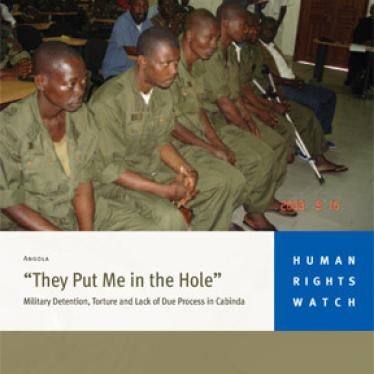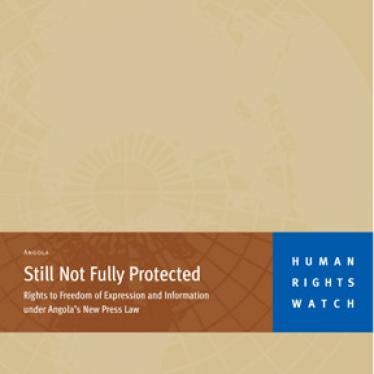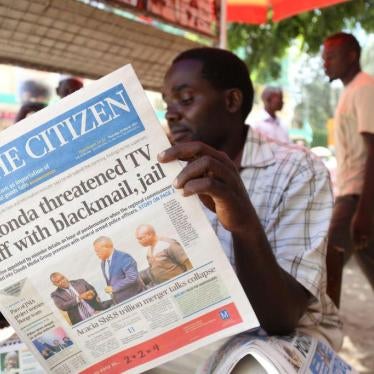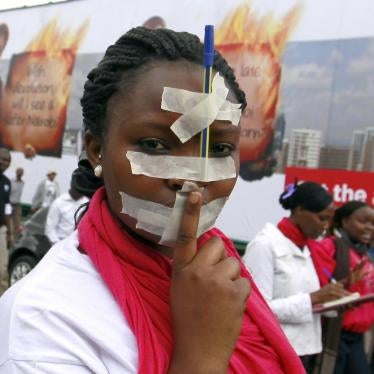(New York) - The Angolan government should ensure freedom of the press as host of the Africa Cup of Nations, Human Rights Watch said today. The football tournament will take place January 10 to 31, 2010, in four coastal towns in Angola, including in the oil-rich enclave of Cabinda, site of a long-standing separatist insurgency.
On December 13, 2009, agents of the Rapid Intervention Police detained the jurist and local correspondent of the Voice of America in Cabinda, José Manuel Gimbi, and the international Dow Jones Newswires reporter, Benoȋt Faucon, near the new football stadium built for the Africa Cup of Nations. They were apparently detained because Faucon photographed the stadium. The two were taken to several military and police garrisons and to the criminal investigation police, where they were questioned and then released without charge five hours later.
"The Africa Cup of Nations is an opportunity for Angola to showcase its progress after years of debilitating civil war," said Georgette Gagnon, Africa director at Human Rights Watch. "But by arbitrarily arresting and intimidating journalists, Angolan officials draw attention to how far the country still has to go."
"Gimbi told Human Rights Watch that the criminal investigation police and others who interrogated him and Faucon questioned them about whom they had met in the course of their work in Cabinda. The officers cited laws to justify detaining them, but the laws cited do not exist in Angola's legal code. Gimbi said that Angolan security forces and domestic intelligence services have harassed him repeatedly, apparently seeking to curtail his reporting on Cabinda.
This pressure intensified after Gimbi reported on a November 18 armed assault on an oil prospecting van used by the state-owned oil company, Sonangol, near the town of Landana, close to the football stadium. A Chinese citizen was kidnapped by the attackers. The state-owned press did not report on the incident. Journalists working for state-owned media in Cabinda, and elsewhere in Angola, are commonly subject to censorship and frequently practice self-censorship.
The local correspondents of Voice of America and the Catholic church-owned Rádio Ecclésia are the only independent journalists based in Cabinda.
In November, Rádio Comercial de Cabinda, a station owned by senior officials of the ruling party, the Popular Movement for the Liberation of Angola (MPLA), discontinued a political debate program funded by the Open Society Foundation, the local affiliate of the international nongovernmental organization, by alleging that the group was not legally registered in Angola.
In a report published in June, "‘ They Put me in the Hole': Military Detention, Torture and Lack of Due Process in Cabinda," Human Rights Watch documented the unfair trial of former Voice of America journalist Fernando Lelo, whom a military court had sentenced to 12 years in prison for national security offenses in 2008. His arrest was part of a crackdown against more than 40 people accused of rebel activity between September 2007 and July 2009. Many of those detained alleged that they were tortured by the military.
The Military Supreme Court acquitted and released Lelo in August, but it re-sentenced five of his co-accused soldiers to 20 to 24 years in prison, despite torture allegations and apparent lack of evidence against them. Lelo received no compensation or remedy for his ordeal, despite having spent two years in prison. His case has led other journalists to refrain from public reporting on politically sensitive issues in Cabinda.
"Freedom of expression is under threat in Angola," said Gagnon. "Angolan officials should refrain from preventing journalists from reporting on matters of legitimate public interest."
Background
A 2006 peace agreement between the government of Angola and a faction of the separatist guerrilla movement Front for the Liberation of the Enclave of Cabinda (FLEC) sought to bring a formal end to the armed conflict in Cabinda, which has endured since Angola's independence in 1975. The Angolan government claims that the war in Cabinda is over. However, sporadic attacks on government forces and expatriate workers have continued, and a faction of the rebel group has threatened to increase activities ahead of the 2010 Africa Cup of Nations. The Angolan government has long used security concerns to crack down on freedom of expression and the press in Cabinda.








